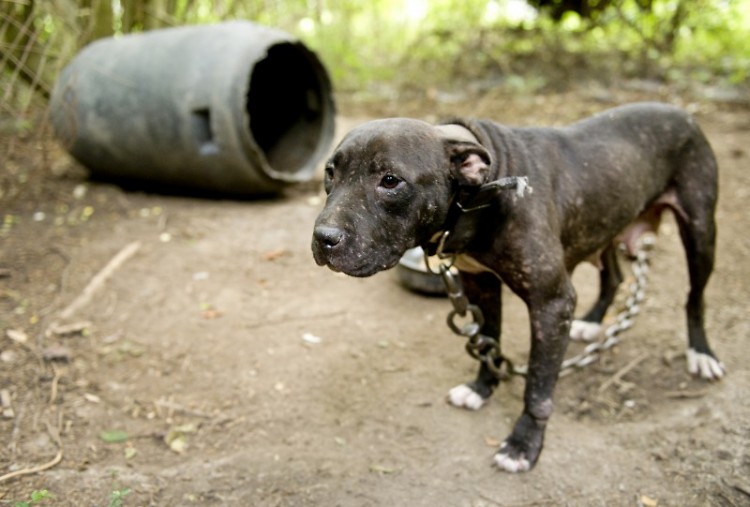When it comes to dog fighting laws, the “Mitten State” is about to take the gloves off.
Michigan’s House of Representatives is expected to vote this week on legislation that would put into effect the toughest dog fighting penalties in the nation. Three bills, which passed unanimously in the state senate in January, are scheduled for a third reading and vote in the house as early as today.
The aim of the bills, sponsored by senators Rick Jones (R-Grand Ledge), Bert Johnson (D-Detroit) and Steve Bieda (D-Warren), is to eradicate animal fighting by making the punishment for those associated with the crime severe enough to take away any incentive for would-be fighters. In essence, the three bills would:
- Allow law enforcement to seize all properties gained from animal fighting, including money made from gambling or the sale of animals related to fighting;
- Define animal fighting as a public nuisance, thereby giving private citizens and prosecutors the right to file suit against those using property – including buildings, vehicles, boats, aircraft or property – for animal fighting;
- Would amend the state’s racketeering statute to include animal fighting, allowing for fines and punishment to equal those applied to organized crime.
Michigan could be an example for the rest of the country, since no other state currently has all three proposed measures on its books.
“The point of all this, especially the asset forfeiture and the racketeering angle, is to remove some of the financial incentive to be involved in these things,” said John Goodwin, the director of animal cruelty policy for the Humane Society of the United States (HSUS).
Jill Fritz, the Michigan state director of HSUS, said the bills not only eliminate financial incentives for animal fighters, they also would help law enforcement agencies to crack down on operations in Michigan. Fritz was among those who testified before the House Judiciary Committee in late January.
“It’s a win-win for everybody,” Fritz said. “Animal fighting is a violent criminal enterprise that almost always involves other crimes such as drug sales and possession, weapons and illegal gambling. It’s a win for society and for law enforcement to be able to seize the assets and offset the financial cost of fighting dog fighting. The money (from seized assets) will go back into law enforcement to catch (animal fighters).”
Fritz said HSUS has been working with law enforcement around the state, including animal control officers at the Kent County Animal Shelter and a training session in Muskegon, on identifying animal fighting activity and arresting and prosecuting those responsible. She said last year, one state police officer went back to her district not long after the training and was able to identify an animal fighting operation.
“We teach them how animal fighters network with each other through websites, magazines and even down to the tattoos or clothing they’re wearing to identify themselves as fighters,” Fritz said. “We teach them what to look for at a site to identify it as an animal fighting operation, such as the apparatus used to train dogs and roosters, the drugs they use, the fight sticks they use to pry open dogs’ mouths to separate them, the registries they use for breeding of the dogs who are champion fight dogs … how to look for those things and write them into a search warrant and all the steps they have to go through.”
Joe Dainelis, Animal Control supervisor of Kent County, said the new laws would greatly benefit his department.
“The supporting argument is, the money would go back to the law enforcement agency that pursued the case,” Dainelis said. “It takes a long time and a lot of work to get evidence, a warrant and proceed with a criminal case and our organization is already tight on budget. If the money could be used to fight the crime, it would be good.” Citizens of Grand Rapids have held events around town, raising money for a national campaign called End Dogfighting.
Goodwin said while dog fighting is prevalent in the Detroit area, it also exists in West Michigan. He said there are two types of operations: street fighting and organized fighting.
“The street fighting is the younger guys in neighborhood that don’t necessarily know anything about organized fighting,” Goodwin said. “They’re not as committed to dog fighting and it’s not as much a part of their identity.”
HSUS has a program in place to encourage street fighters to take a different approach to their dogs.
“We hire people who used to fight dogs in their neighborhood to become ambassadors,” Goodwin said. “We also bring in dog trainers and set up pit bull training teams so we train the dogs and the young men that have them and help them see the dogs in a different light, as a companion and a friend.
“We try to change the culture that way and show them that dog fighting is a dead-end activity that will ruin their lives. We show them how to have a proper relationship with pit bulls, in a nonexploitive way. They’ll have a friend for life, and they won’t risk going to prison and losing everything they own.”
The HSUS has concentrated its efforts in big cities like Chicago, Atlanta and Philadelphia, but Goodwin said local communities can adopt similar programs on their own.
“Communities need to put resources into it,” he said. “HSUS is putting a lot of staff time and money into these programs because we feel like they’re effective, but we can only do it in a few communities. We’re hoping other people will take these programs and replicate them, maybe with their own twist.”
Organized fighting, Goodwin said, is a more complex operation that requires resources for lengthy investigations to identify participants and piece together the network.
A raid of a dog fight in Monroe County last March led to the arrest of 26 people and the recovery of $40,000 in cash as well as cocaine, marijuana, training equipment and a handgun. Those arrested were from Michigan, Indiana, Ohio, Missouri and Georgia.
“Most raids happen on the places where they’re actually raising dogs and not necessarily fights themselves,” Goodwin said. “But they need to seize all that gambling money and some of that can offset the cost of these investigations. If we can get these bills enacted it might be a net financial plus for counties to crack down on animal fighters. They can take away their assets, and there’s some pretty big money in these. I’d much rather see the taxpayer have the money than a dog fighter.”
While Michigan has been strapped for revenue and has faced budget cuts for the past several years, Fritz said the new laws would help in several areas.
“It would bring more revenue in to law enforcement,” Fritz said. “And, when law enforcement goes in, they’re not only finding dog fighting, but they’re most certainly finding weapons, illegal gambling activities, drugs and other violent crime activities, so it’s not just a humane issue but a community safety issue as well.”
The Rapidian, a program of the 501(c)3 nonprofit Community Media Center, relies on the community’s support to help cover the cost of training reporters and publishing content.
We need your help.
If each of our readers and content creators who values this community platform help support its creation and maintenance, The Rapidian can continue to educate and facilitate a conversation around issues for years to come.
Please support The Rapidian and make a contribution today.
Comments, like all content, are held to The Rapidian standards of civility and open identity as outlined in our Terms of Use and Values Statement. We reserve the right to remove any content that does not hold to these standards.

